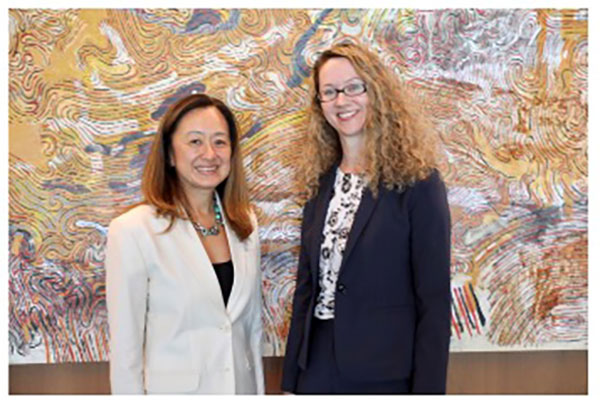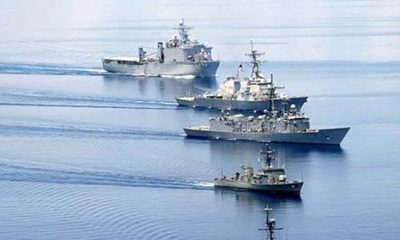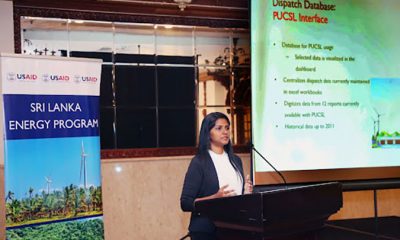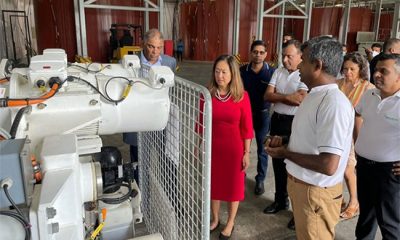News
US National Security, foremost factor in ‘Export Control & Border Security’ project in Sri Lanka: ex-State Dept employee

Retired Foreign Service National Political Specialist of the U.S. Department of State Daya Gamage who was in the Political Division of the US Embassy in Sri Lanka has said that the US was stepping up an operation here meant to enhance its own security.
American ambassador Julie Chung announced recently the arrival of an official to join her diplomatic staff, in the wordings of a twitter message from the ambassador “Welcome a new team member from US Export Control and Border Security (EXBS) to work with the GoSL to develop and enhance systems for safe, productive ports, ensuring SL can strengthen trade and exports to build the economy in this challenging period.”
The announcement largely went unnoticed as it would have been considered another Washington assistance to lift Sri Lanka’s economy from its current doldrums, he said.
In what manner could Washington endeavor to help “for safe, productive ports, ensuring SL can strengthen trade and exports,” never came to anyone’s mind, Gamage added.
Gamage issued the following statement: “On the face of the announcement Washington intentions were to “strengthen trade and exports to build the economy in this challenging period” which is an immediate need of Sri Lanka, but the background check revealed the foremost objective was indeed to strengthen and enhance the national security of the United States which was its prime focus since 2016 with the undertaking of building military capabilities and economic power in the Indo-Pacific region to lessen the clout of China. What happened here, with the arrival of the official from Washington, is that the United States Government stepped into Sri Lanka, which is strategically located at the center of the Indo-Pacific region to do just that.
The US is already has three defense and technology agreements with India.
It is interesting to find out the covert motives behind the declared intention to assist Sri Lanka, and how Washington could ‘bind’ Sri Lanka to assist its foremost objective in further strengthening its national security at a time when there is an imminent threat from China in the Indo-Pacific region.
Despite the Rajapaksa-controlled political entity continues to hold a clout in the legislature with its national and global credibility at a low ebb, it has collaborated with its presidential nominee Ranil Wickremasinghe for the latter to have a free hand in the governance knowing full well that he has better inroads to Western portals of power centers to seek economic assistance. The US has 16.6% control over the IMF and a greater clout in the World Bank.
Of course, Ranil Wickremasinghe as prime minister during 2002-2004 period – under Chandrika Kumaratunga’s disabled presidency – due to her political coalition losing control of the legislature in December 2001 elections followed by the surrender of the vital foreign and defense establishments to the prime minister of her rival party – signed two military agreement with the U.S. to facilitate to protect (from the International Criminal Court) alleged American war criminals engaged in Iraq and Afghanistan, and extend the facilities of the Colombo Airport to have easy transfer of alleged 9/11` terrorists in American custody to CIA torture chambers in other countries. India refused to sign both these agreements, vehemently opposing them. Washington progressively increased economic assistance during Wickremasinghe tenure due to the then Deputy Secretary of State Richard Armitage’s direct involvement in GSL-LTTE peace talks. The Norwegian negotiator Erik Solaheim, who was found favoring the LTTE at that time arrived in Colombo last week as an advisor on environment to President Ranil Wickremasinghe.
Could be Washington’s reading was correct – well fed by Julie Chung’s diplomatic post in Colombo – that President Ranil Wickremasinghe could facilitate to achieve what is intended by sending an official to fulfill the ‘national security’ tasks embedded in four U.S. federal regulations: (1) U.S. Export Control and Border Security (2) Export Control Reform Act (3) Export Administration Regulations and, (4) Bureau of Industry and Security.
The new arrival from Washington’s Export Control and Border Security is attached to the US Commerce Department under which the four US Federal regulations are strictly enforced through overseas diplomatic missions of the US Department of State under which Ambassador Julie Chung functions.
As Ambassador Chung herself in a twitter notification – announcing the new arrival from Washington – mentioned the use of US Export Control and Border Security to strengthen Sri Lanka’s trade and export, it is pertinent to find out what the US Export Control Policy is:
With the stated policy to preserve the qualitative military superiority of the U.S. and to strengthen the U.S. defense industrial base, Washington will use export controls considering the impact of its economy to restrict the export of items which would make a significant contribution to the military potential of any other country while strengthening U.S. defense industrial base.
On May 16, 2019 the China-based Huawei Technologies operating in Sri Lanka was black listed by the Government of the United States. This is one of the world’s largest providers of telecommunications equipment, networking gear, smart phones and more.
The U.S. Department of Justice (DOJ) on January 28, 2019, charged Huawei with bank fraud and stealing trade secrets. Huawei denied the U.S. charges, saying requests to meet with the US Justice Department had been “rejected without explanation.” The company said that the trade secret theft allegations were “already the subject of a civil suit that was settled by the parties.”
The targeted goals of the US Export Control Policy were, to carry out the foreign policy of the United States, including the protection of human rights and the promotion of democracy, to ensure national security controls are tailored to focus on those core technologies and other items that are capable of being used to pose a serious national security threat to the United States, to ensure national security controls are tailored to focus on those core technologies and other items that are capable of being used to pose a serious national security threat to the United States. One other objective is the national security of the United States requires that the United States maintain its leadership in the science, technology, engineering, and manufacturing sectors, including foundational technology that is essential to innovation. Such leadership requires that United States persons are competitive in global markets. The last objective explains why Washington black listed Huawei Technologies operating in many countries including Sri Lanka.
The Export Control Policy document has clearly stated that the “US needs to do the hard internal work of deciding which specific commodities, software, and technologies should, for example, be controlled to (i) respond to human rights abuses; (ii) support a “global level playing field;” (iii) address “legal, ethical, and political concerns” about emerging technologies; (iv) respond to civil-military fusion policies in countries of concern; (v) avoid disruptions to strategic supply chains; and (vi) respond to “technology acquisition strategies, including economic coercive measures.” The primary agencies responsible for such work are the export control agencies at the departments of Commerce, Defense, State, and Energy.”
It is within these parameters that the Government of the United States will engage in discourses with the Government of Sri Lanka, and an experienced official from the US Department of Commerce, just arrived at the American Embassy, to fulfill Washington’s desire to hold onto its hegemony in the Indo-Pacific region.
What is understood and seen from outside is “to work with the GoSL to develop and enhance systems for safe, productive ports, ensuring SL can strengthen trade and exports to build the economy in this challenging period.”
News
US sports envoys to Lanka to champion youth development

The U.S. Embassy in Colombo welcomed the U.S. Sports Envoys to Sri Lanka, former National Basketball Association (NBA) and Women’s National Basketball Association (WNBA) players Stephen Howard and Astou Ndiaye, from June 8 through 14.
The Public Diplomacy section of the U.S. Embassy said that it would launch a weeklong basketball program intended to harness the unifying power of sports, made possible through collaboration with Foundation of Goodness and IImpact Hoop Lab.
While in Sri Lanka, Howard and Ndiaye, both retired professional basketball players, will conduct a weeklong program, Hoops for Hope: Bridging Borders through Basketball. The Sports Envoys will lead basketball clinics and exhibition matches and engage in leadership sessions in Colombo and Southern Province for youth aged 14-18 from Northern, Uva, Eastern and Western Provinces, offering skills and leadership training both on and off the court. The U.S. Envoys will also share their expertise with the Sri Lanka Basketball Federation, national coaches, and players, furthering the development of basketball in the country. Beyond the clinics, they will collaborate with Sri Lankan schoolchildren to take part in a community service project in the Colombo area.
“We are so proud to welcome Stephen and Astou as our Sports Envoys to Sri Lanka, to build on the strong people-to-people connections between the United States and Sri Lanka,” said U.S. Ambassador Julie Chung. “The lessons that will be shared by our Sports Envoys – communication, teamwork, resilience, inclusion, and conflict resolution – are essential for leadership development, community building, equality, and peace. The U.S. Sports Envoy program is a testament to our belief that sports can be a powerful tool in promoting peace and unity.”
News
Rahuman questions sudden cancellation of leave of CEB employees

SJB Colombo District MP Mujibur Rahuman in parliament demanded to know from the government the reasons for CEB suspending the leave of all its employees until further notice from Thursday.
MP Rahuman said that the CEB has got an acting General Manager anew and the latter yesterday morning issued a circular suspending leave of all CEB employees with immediate effect until further notice.
“We demand that Minister Kanchana Wijesekera should explain this to the House. This circular was issued while this debate on the new Electricity Amendment Bill was pending. There are many who oppose this Bill. The Minister must tell parliament the reason for the urge to cancel the leave of CEB employees,” the MP said.However, Speaker Mahinda Yapa Abeywardena prevented Minister Wijesekera responding to the query and said that the matter raised by MP Rahuman was not relevant.
News
CIPM successfully concludes 8th Annual Symposium

The Chartered Institute of Personnel Management (CIPM) successfully concluded the 8th Annual CIPM Symposium, which took place on 31st May 2024. Themed “Nurturing the Human Element—Redefining HRM in a Rapidly Changing World,” the symposium underscored the pivotal role of human resource management (HRM) in today’s dynamic global landscape. Since its inception in 1959, CIPM has been dedicated to advancing the HR profession through education, professional development, and advocacy, solidifying its position as Sri Lanka’s leading professional body for HRM.
Ken Vijayakumar, the President of the CIPM, graced the occasion as the chief guest. The symposium commenced with the welcome address by the Chairperson, Prof. Arosha Adikaram, followed by the Web Launch of the Symposium Proceedings and Abstract Book by the CIPM President. The event featured distinguished addresses, including a speech by Chief Guest Ken Vijayakumar, President of CIPM, and an address by Guest of Honor Shakthi Ranatunga, Chief Operating Officer of MAS Holdings Pvt. Ltd., Sri Lanka.
The symposium also featured an inspiring keynote address by Prof. Mario Fernando, Professor of Management and Director of the Centre for Cross Cultural Management (CCCM) at the University of Wollongong, Australia.
Vote of Thanks of the inauguration session was delivered by Dr. Dillanjani Weeratunga, Symposium Co-chair.
The symposium served as a comprehensive platform for researchers to present their findings across a wide range of critical topics in HRM. These included Cultural Diversity and Inclusion, Talent Development and Retention, Ethical Leadership and Corporate Social Responsibility, Adapting to Technological Advancements, Mental Health and Well-being at Work, Global Workforce Challenges, Employee Empowerment, and Reskilling and Upskilling.
The plenary session was led by Prof. Wasantha Rajapakse. Certificates were awarded to the best paper presenters during the valedictory session, followed by a vote of thanks delivered by Kamani Perera, Manager of Research and Development.
The annual symposium of CIPM was a truly inclusive event, attracting a diverse audience that spanned undergraduates, graduates, working professionals, research scholars and lecturers. This widespread interest highlights the symposium’s significance in the field of HRM, offering a unique opportunity for everyone to network and learn from scholarly brains.The CIPM International Research Symposium was sponsored by Hambantota International Port, Sri Lanka Institute of Information Technology (SLIIT), E B Creasy & Co. PLC, and Print Xcel Company.
























